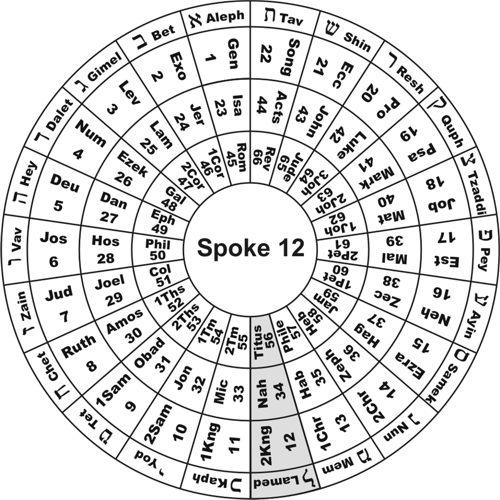Elijah and Elisha (Rabbi and Talmid)
And it came to pass, when the LORD would take up Elijah into heaven by a whirlwind,
that Elijah went with Elisha from Gilgal. And Elijah said unto Elisha, Tarry here, I pray thee; for
the LORD hath sent me to Bethel. And Elisha said unto him, As the LORD liveth, and as thy soul liveth,
I will not leave thee.
2 Kings 2:1f (Spoke 12, Cycle 1)
The twelfth book interweaves two themes. It continues the history of the breakdown of the Davidic Kingdom after
its division in 1 Kings 12 into the northern Kingdom of Israel (ten tribes) and the southern Kingdom of Judah
(two tribes). It records their history up to the Assyrian captivity of Israel (2 Kings 17) and the later Babylonian
captivity of Judah (2 Kings 24). Entwined throughout the first ten chapters, set in the Northern Kingdom,
we find the story of the final works of the Prophet Elijah, his ascension into heaven in a chariot of fire,
and the many miracles of his disciple (talmid) Elisha after he had received the mantle of his master.
Their relation is a classic example of a Rabbi and his Talmid. It began when Elijah chose
Elisha as his disciple by casting his "mantle" upon him:
So he departed thence, and found Elisha the son of Shaphat, who was plowing with twelve yoke of oxen
before him, and he with the twelfth: and Elijah passed by him, and cast his mantle upon him.
And he left the oxen, and ran after Elijah, and said, Let me, I pray thee, kiss my father and my mother,
and then I will follow thee. And he said unto him, Go back again: for what have I done to thee?
And he returned back from him, and took a yoke of oxen, and slew them, and boiled their flesh with
the instruments of the oxen, and gave unto the people, and they did eat. Then he arose, and went after Elijah,
and ministered unto him.
1 Kings 19:19ff
The idea of following defines the Master/Disciple relationship.
Jesus typically called his disciples by saying "Follow me." Elisha's devotion to his master is strongly emphasized in
the triple repetition of his of vow, "As the LORD liveth, and as thy soul liveth, I will not leave thee"
(2 Kings 2:2, 4, 6). A. M. Hodgkin explained the relation between Elijah and Elisha in his review of every Book of
the Bible called Christ in All the Scriptures:
The blessing that Elisha craved in asking for a double portion of the spirit of his master,
when Elijah was about to be taken from him [2 Kings 2:9], was not to be twice as great, but to have
the portion of the first-born son. The first-born son inherited a double portion of his father's property,
twice as much as each of the other sons. Elisha asked to have the prophetic office, and with it
the power of the Sprit to enable him to fulfill it. In this last scene we sometimes almost wonder whether we
are in the Old Testament or the New. We have an ascending master, a waiting disciple,
a descending power.
"Ye shall receive power, after that the Holy Ghost is come upon you: ye shall be witnesses unto Me."
Paul's Pastoral Epistles to Timothy and Titus, both of whom he addressed as "my own son" (1 Tim 1:2, Titus 1:4),
exemplify the relation of the disciple as the "son" of his teacher. The same thing is seen when Elisha cried
"My father, my father!" as he watched Elijah ascend into heaven in a chariot of fire (2 Kings 2:12).
As he went up, Elijah's mantle literally fell to Elijah who then carried on his master's prophetic ministry,
and did even greater miracles. He also was affiliated with various schools of the prophets (2 Kings 2:3, 5, 7, 12, 15).
|



